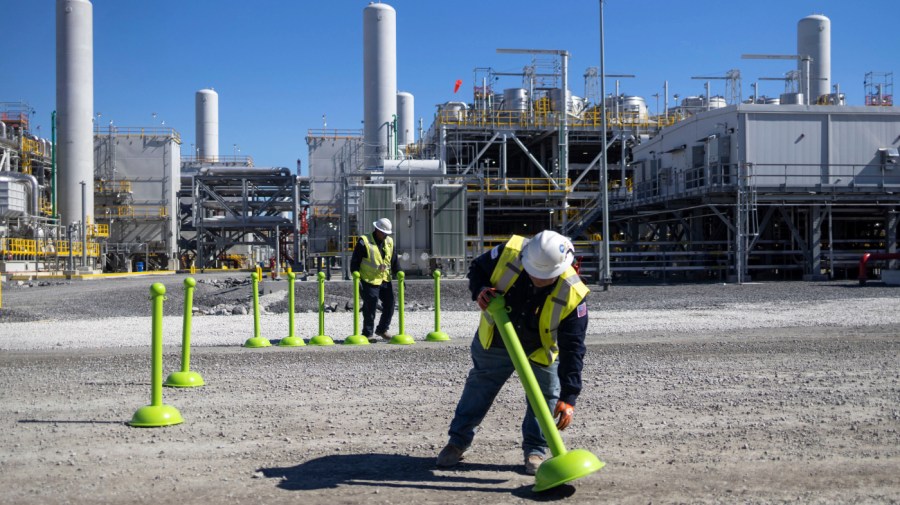In a Supreme Court docket stuffed with blockbuster cases, it has been easy to miss the news about a dispute with a puzzling line-up of litigants: a deep-red, energy-rich state — Louisiana — suing the very energy producers that have been central drivers of the state and national economy.
This case, and other similar ones, are not just legally dubious — they could also harm the country’s efforts to meet our growing energy challenges.
At the outset of World War II, the U.S. government recognized that oil was going to be a key to victory. Partnering with industry, Uncle Sam entered into numerous contracts for the production of crude oil. Much of that activity happened in Louisiana, and since the war ended the energy production in the state has only continued to expand.
Companies, acting with valid state and federal permits, have built a sprawling system of offshore production, pipelines and terminals. The state now ranks third in natural gas production, has one-sixth of the nation’s refining capacity and is home to a growing liquefied natural gas export capacity.
But starting in 2013, over 40 Louisiana parishes filed lawsuits against the companies. They claimed that decades of oil and gas activity accelerated coastal land loss, and they are seeking billions of dollars in damages. This spring, a Plaquemines Parish jury hit Chevron with a $744.6 million verdict.
Chevron, supported by the Trump administration, former U.S. attorneys general and former chairmen of the Joint Chiefs of Staff, has now petitioned the Supreme Court to move the dispute from state to federal court, arguing that it is a more appropriate and fairer venue.
The jurisdictional question matters, but even more important is the impact these Louisiana lawsuits, and others like them around the country, could have on U.S. energy security, the economy and even conservation projects.
President Trump has made U.S. energy dominance a central priority. His Unleashing American Energy executive order directed increased exploration and production on federal lands and waters. A subsequent, companion order, Protecting American Energy from State Overreach, sought to curb state-level barriers to energy infrastructure.
The Louisiana lawsuits do exactly the opposite: They add uncertainty, invite endless litigation and send a chilling message to energy producers considering billions in new investment.
And the need for energy has never been greater. The artificial intelligence revolution is fueling a massive surge in electricity demand. Data centers consume enormous amounts of power, much of it supplied by natural gas.
Louisiana is already cashing in. Meta announced a $10 billion, four-million-square-foot AI data center in Richland Parish, its largest in the world, which will require new natural gas plants. Hut 8 is building a $2.5 billion campus in West Feliciana Parish.
These projects promise thousands of jobs and billions in investment. Yet they depend on the very energy infrastructure now under legal attack in Louisiana. The contradiction is striking: Local governments and juries are punishing oil and gas companies while the state is welcoming data-hungry industries that will only deepen reliance on them.
And just this year, in the One Big Beautiful Bill Act, Congress raised the Gulf of Mexico Energy Security Act revenue-sharing cap by 30 percent, from $500 million to $650 million per year. Of that, $487.5 million will go to Gulf Coast states, including Louisiana, and $162.5 million to the Land and Water Conservation Fund.
Louisiana officials estimate this will mean an additional $46 million per year flowing directly into the state’s Coastal Trust Fund for restoration and environmental protection. But this increase only matters if production continues to grow, something that the lawsuits cut against.
So why is Louisiana pressing ahead? Many point to the influence of the trial bar. For years, trial lawyers have pushed these cases, which promise eye-popping payouts for local governments. Republican Gov. Jeff Landry, despite his otherwise pro-industry profile, has thrown his weight behind the litigation.
It raises a blunt question: Are these lawsuits about saving wetlands, or about funneling billions from America’s energy backbone into the pockets of lawyers?
Louisiana should be leading the charge for American energy, not undermining it. The stakes here are bigger than Plaquemines Parish or even the Gulf Coast. They touch every American who depends on affordable and reliable energy.
The country should be pursuing an all-of-the-above strategy to meet our growing energy needs, supply energy to our allies, and build our economy. Policies that encourage responsible development are the way to go; lawsuits that seek to rewrite the rules and enrich trial lawyers are not.
Jeffrey Kupfer, a former acting deputy secretary of Energy in the George W. Bush administration, is the president of ConservAmerica.














